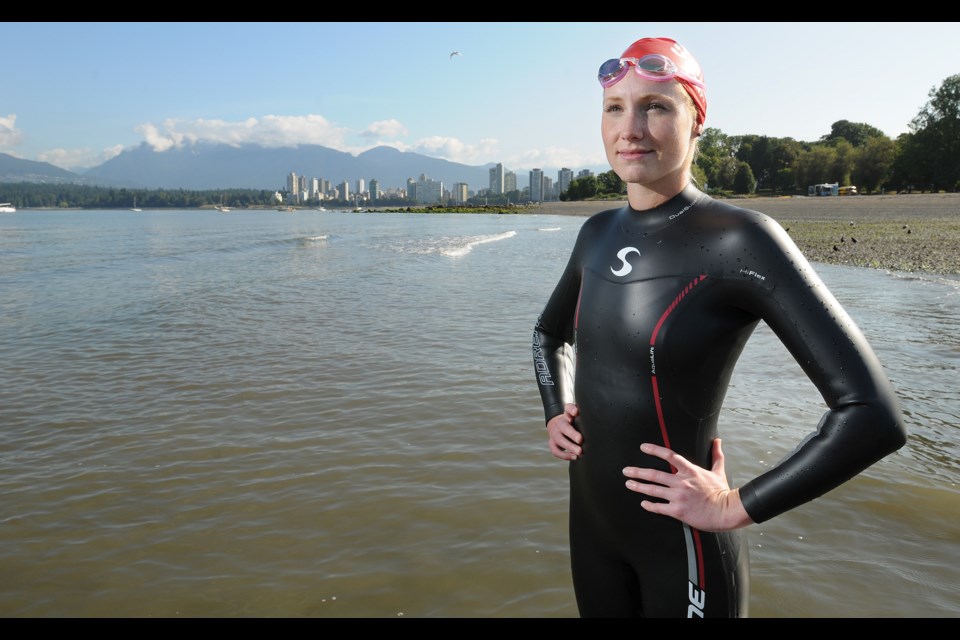Taryn Lencoe plans to swim for 12 hours straight this Saturday.
She expects to plunge into the water at Kitsilano Beach at 7 a.m. and emerge pruned but satisfied at 7 p.m. to raise awareness and money for multiple sclerosis.
MS is a chronic disease of the brain and spinal cord that has affected Lencoe’s cousin for more than 10 years.
“I’ve always been a swimmer,” the 28-year-old Lencoe said. “It just seemed like the natural thing to do.”
Lencoe chose to swim during the busy daytime hours when people with MS tend to struggle most.
“I wanted to challenge myself beyond what I normally experience for 12 hours as well,” she is quoted as saying in a press release issued by the MS Society of Canada’s B.C. and Yukon division.
MS is the most common neurological disease of young adults in Canada. An estimated 100,000 people in Canada cope with MS. Most people with this disease are diagnosed between the ages of 15 and 40.
“I want people to know [MS] is more common than they think,” Lencoe said. “It happens quite quickly and if, unlike my cousin, you end up with a progressive form of MS you could be functioning normally one day and then all of a sudden something weird happens and you could be in a wheelchair less than a year later.”
The disease attacks the myelin sheath, the protective covering to the nerves of the central nervous system.
“Tingling in the extremities is usually the very first symptom and it was for my cousin,” Lencoe said. “A lot of people don’t know what it is. They might think, ‘Oh my goodness am I having a stroke? What’s happening to me right now?’ It can even be really difficult to diagnose.”
Exhaustion is another common symptom of MS.
To handle her own exhaustion, Lencoe will take a 10-minute break every three hours.
She’ll kick and stroke to the 12-hour soundtrack she’s programmed on her waterproofed iPod and will be accompanied by a kayaker.
The former competitive swimmer, who raced with the University of B.C. Thunderbirds and for the Canadian National Swim Team, has trained for her 12-hour swim for 15 months, spending between one and three hours a day in the pool.
Lencoe moved from an indoor pool to the outdoor pool at Kits Beach, where she swam for six hours in succession in June.
“I’m most concerned about the elements,” she said. “I definitely had a sunburn after [the six-hour swim at Kits… I’m concerned about whether or not the waves are going to tire me out a lot more than the pool.”
She’s been gorging on potatoes and proteins to prepare for the cold.
Lencoe discovered the U.S.-based sport company Synergy makes a wetsuit with thin shoulders. She contacted Synergy which sent her a free wetsuit, allaying her fears about hypothermia and ruining her shoulders.
She’s packing granola bars and bananas for her breaks.
“I spoke to someone who runs [extreme marathon] races and he said in the middle of it you’ll probably crave something really random,” she said. “I might want a hot dog.”
Lencoe aims to raise $10,000 for the B.C. chapter of the MS Society, which provides services to people with MS and their families and funds research to find the cause and cure for the disease. She raised $9,400, most of it from a concert a friend of her family performed at in July. Her aunt and uncle from the Okanagan also recently visited and they’ve helped spread the word and collect donations.
Lencoe hopes spectators will flock to Kits Beach Aug. 16 to cheer her on, learn about MS from the society and donate.
Symptoms of MS may include dizziness, problems swallowing, cognitive impairment, depression and difficulty walking. In its most common form, MS features well-defined attacks followed by complete or partial recovery. More permanent nerve damage can occur over time. The severity of MS, progression and specific symptoms cannot be predicted at the time of diagnosis.
For more information or to donate, see mssociety.ca or swimms.squarespace.com.
crossi@vancourier.com
twitter.com/Cheryl_Rossi



